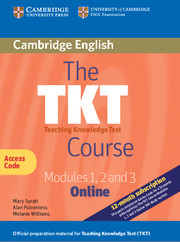Book contents
- Frontmatter
- Contents
- Introduction
- Tips for preparing for the TKT
- Module 1 Language and background to language learning and teaching
- Part 1 Describing language and language skills
- Part 2 Background to language learning
- Part 3 Background to language teaching
- Module 2 Lesson planning and use of resources for language teaching
- Part 1 Planning and preparing a lesson or sequence of lessons
- Part 2 Selection and use of resources
- Module 3 Managing the teaching and learning process
- Part 1 Teachers' and learners' language in the classroom
- Part 2 Classroom management
- Sample TKT answer sheet
- Exam tips for the TKT
- Answer key for Follow-up activities
- Answer key for TKT practice tasks
- Answer key for TKT practice tests
- Alphabetical list of glossary terms
- Unit-by-unit list of glossary terms
- Acknowledgements
Introduction
Published online by Cambridge University Press: 05 November 2012
- Frontmatter
- Contents
- Introduction
- Tips for preparing for the TKT
- Module 1 Language and background to language learning and teaching
- Part 1 Describing language and language skills
- Part 2 Background to language learning
- Part 3 Background to language teaching
- Module 2 Lesson planning and use of resources for language teaching
- Part 1 Planning and preparing a lesson or sequence of lessons
- Part 2 Selection and use of resources
- Module 3 Managing the teaching and learning process
- Part 1 Teachers' and learners' language in the classroom
- Part 2 Classroom management
- Sample TKT answer sheet
- Exam tips for the TKT
- Answer key for Follow-up activities
- Answer key for TKT practice tasks
- Answer key for TKT practice tests
- Alphabetical list of glossary terms
- Unit-by-unit list of glossary terms
- Acknowledgements
Summary
The TKT Course Modules 1, 2 and 3
The TKT Course Modules 1, 2 and 3 is the second edition of The TKT Course. In this second edition you will find a range of new material that makes this edition different from the first edition:
Revised and expanded information on the key concepts related to each area of the TKT syllabus
An additional unit on ‘Approaches to language teaching’ reflecting the TKT syllabus
New tasks in each unit for the Follow-up, Reflection, Discovery and exam practice sections
New practice tests
An expanded glossary reflecting the revised TKT Glossary
A new section on ‘Tips for preparing for the TKT’, which aims to help you study by yourselves and make full use of all opportunities for working towards the TKT.
The TKT Course Modules 1, 2 and 3 Online
The TKT Course Modules 1, 2 and 3 is also available online. If you subscribe to the online version at cambridgetkt.english360.com you will get all the material from the print edition in an interactive format plus:
Six additional interactive TKT practice tests, matching the latest Cambridge ESOL TKT computer-based tests
‘Ask the author’ videos giving an expert view on classroom issues focused on in the Reflection sections
An interactive Glossary Quiz covering the TKT terms
Extra support for TKT trainers.
What is the Teaching Knowledge Test (the TKT)?
The Teaching Knowledge Test (the TKT) is a test developed by Cambridge ESOL for teachers of English to speakers of other languages. It is designed to test candidates’ knowledge of concepts related to language and language use, and the background to and practice of language teaching and learning.
- Type
- Chapter
- Information
- The TKT Course Modules 1, 2 and 3 , pp. 1 - 4Publisher: Cambridge University PressPrint publication year: 2011

